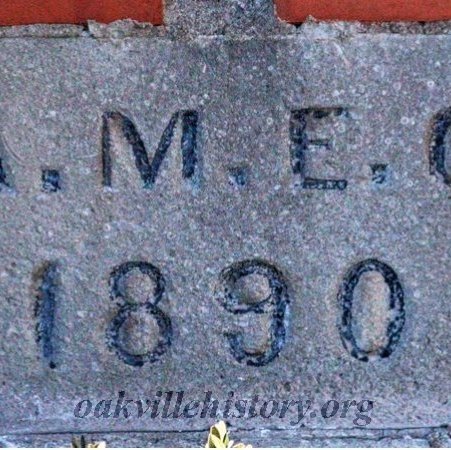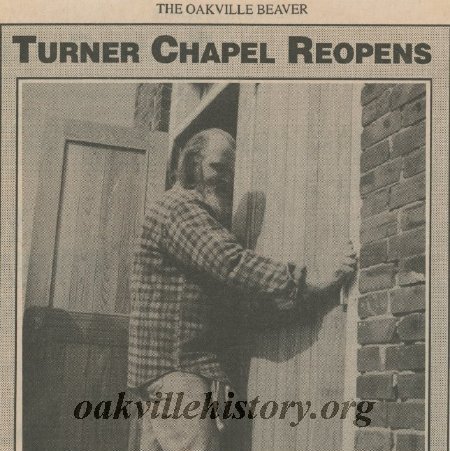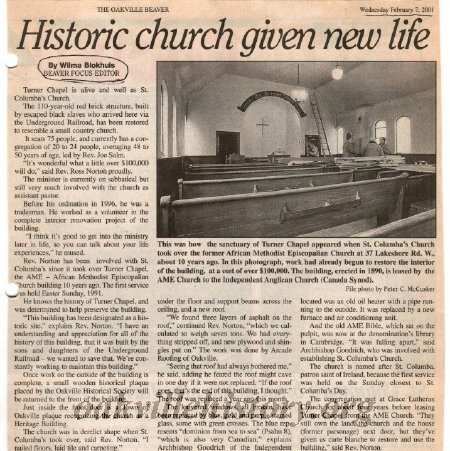Address:
37 Lakeshore Road West - The Turner Chapel
Summary:
The Turner Chapel served the Black community in Oakville
Property Details:
Turner Chapel was an African Methodist Episcopalian Church located at 37 Lakeshore Road West in Oakville, Ontario, Canada. It was established in 1890.
An earlier structure, built on the east side of Sixteen Mile Creek, had burned down. The west side of the river, where artisans lived, was a more welcoming environment for Oakville's "Black Church".
It is telling that the church was named after Bishop Henry McNeal Turner, as he was an advocate of the back-to-Africa movement, and the first black chaplain, appointed by Abraham Lincoln, during the American Civil War.
Outside the present day building there is a sign erected by the Oakville Historical Society. It reads:
African Americans had arrived in the Oakville Bronte area as early as the 1830s. With the passing of the Fugitive Slave Act of 1850 a significant increase was noted in the number of former slaves leaving the northern states and following the North Star into Canada West (Ontario).
Among the arriving fugitives was James Wesley Hill who later would be responsible as an agent of the underground railroad for assisting many former slaves into Canada and giving them temporary employment on his farm to help them get established.
About 1860, Samuel Adams and his brother-in-law, Rev. William Butler (ordained in the A.M.E. church) set about organizing an estimated three or four hundred fugitives in the vicinity. After many set-backs, suitable land was acquired on the present site for a church.
The corner-stone for the building was placed in 1891. On January 1, 1892, the doors of Turner Chapel A.M.E. church were flung open for service under the leadership of Rev. William Roberts. A salute was tendered to Bishop Henry McNeal Turner the first black chaplain in Armed Forces of the U.S.A, and a dedicated community worker, when his name was applied to this sanctuary.
The Chapel was leased from the AME by the St. Columba congregation, a member of the Independent Anglican Church (Canada Synod) in 1991. The congregation undertook a number of renovations and held their first service on Easter Sunday, 1991. The congregation had 20 - 24 members and was led by Rev. Joh Salm and Assistant Pastor Rev. Ross Norton.
The building is currently used by Turner Antiques.
An earlier structure, built on the east side of Sixteen Mile Creek, had burned down. The west side of the river, where artisans lived, was a more welcoming environment for Oakville's "Black Church".
It is telling that the church was named after Bishop Henry McNeal Turner, as he was an advocate of the back-to-Africa movement, and the first black chaplain, appointed by Abraham Lincoln, during the American Civil War.
Outside the present day building there is a sign erected by the Oakville Historical Society. It reads:
African Americans had arrived in the Oakville Bronte area as early as the 1830s. With the passing of the Fugitive Slave Act of 1850 a significant increase was noted in the number of former slaves leaving the northern states and following the North Star into Canada West (Ontario).
Among the arriving fugitives was James Wesley Hill who later would be responsible as an agent of the underground railroad for assisting many former slaves into Canada and giving them temporary employment on his farm to help them get established.
About 1860, Samuel Adams and his brother-in-law, Rev. William Butler (ordained in the A.M.E. church) set about organizing an estimated three or four hundred fugitives in the vicinity. After many set-backs, suitable land was acquired on the present site for a church.
The corner-stone for the building was placed in 1891. On January 1, 1892, the doors of Turner Chapel A.M.E. church were flung open for service under the leadership of Rev. William Roberts. A salute was tendered to Bishop Henry McNeal Turner the first black chaplain in Armed Forces of the U.S.A, and a dedicated community worker, when his name was applied to this sanctuary.
The Chapel was leased from the AME by the St. Columba congregation, a member of the Independent Anglican Church (Canada Synod) in 1991. The congregation undertook a number of renovations and held their first service on Easter Sunday, 1991. The congregation had 20 - 24 members and was led by Rev. Joh Salm and Assistant Pastor Rev. Ross Norton.
The building is currently used by Turner Antiques.






